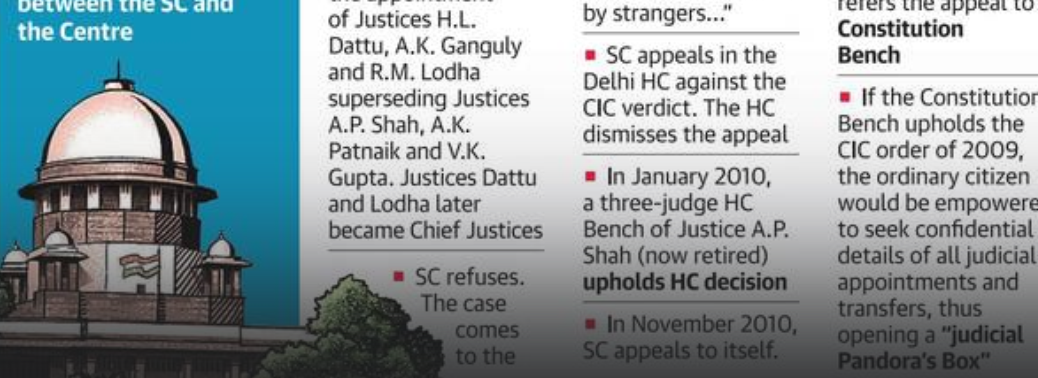RTI SCRUTINY WILL RUIN JUDICIAL INDEPENDENCE
04, Apr 2019

Prelims level : Polity and Governance
Mains level : Paper III – Important aspects of governance, transparency and accountability, e- governance applications, models, successes, limitations and potential, charters.
Why in News:
- Attorney General KK Venugopal told the Supreme Court that any information regarding judges’ appointments cannot be shared with information-seekers under the RTI as it would compromise the judiciary’s independence. AG further said collegiums workings must be confidential.
What is Collegium system:
- The Collegium System is a system under which appointments/elevation of judges/lawyers to Supreme Court and transfers of judges of High Courts and Apex Court are decided by a forum of the Chief Justice of India and the four senior-most judges of the Supreme Court.
- There is no mention of the Collegium either in the original Constitution of India or in successive amendments.
- The Collegiums System of appointment of judges was born through “three judges case”which interpreted constitutional articles on October 28, 1998.
- The recommendations of the Collegium are binding on the Central Government; if the Collegium sends the names of the judges/lawyers to the government for the second time.
- But time limit is not fixed to reply.
Points against the Collegium System:
- Inspite of being a democracy, the judges appoint judges in India. Collegium System could not appoint judges as per the vacancies in the courts due to various reasons. If the constitution makers had liked this way of appointment of judges, they would have envisaged it in the original constitution itself. In the year 2009, Law Commission of India said that nepotism and personal patronage is prevalent in the functioning of the Collegium System. Collegium System is recommending the appointment of the judges without considering the talent available in the market.
Right to Information act:
- The Right to Information (RTI) Act, operationalised in October 2005, was seen as a powerful tool for citizen empowerment. RTI is one of the landmark acts which has led to a significant boost in accountability of the government towards the people.
Basic objective of RTI:
- Empowerment of the citizens.
- Promotion of transparency and accountability in the functioning of the government.
- Prevention and elimination of corruption, Making the democracy work for the people in its real sense.
Central Information commission:
- The Central Information Commission (CIC) set up under the Right to Information Act is the authorized quasi-judicial body, established in 2005. The Central Information Commission is a high-powered independent body which inter alia looks into the complaints made to it and decides the appeals. It entertains complaints and appeals pertaining to offices, financial institutions, public sector undertakings, etc., under the Central Government and the Union Territories.
Quasi-judicial powers:
- CIC/SCIC will have powers of Civil Court such as –
- Summoning and enforcing attendance of persons, compelling them to give oral or written evidence on oath and to produce documents or things
- Requiring the discovery and inspection of documents
- Receiving evidence on affidavit
- Requisitioning public records or copies from any court or office
- Issuing summons for examination of witnesses or documents
- Any other matter which may be Prescribed
<






